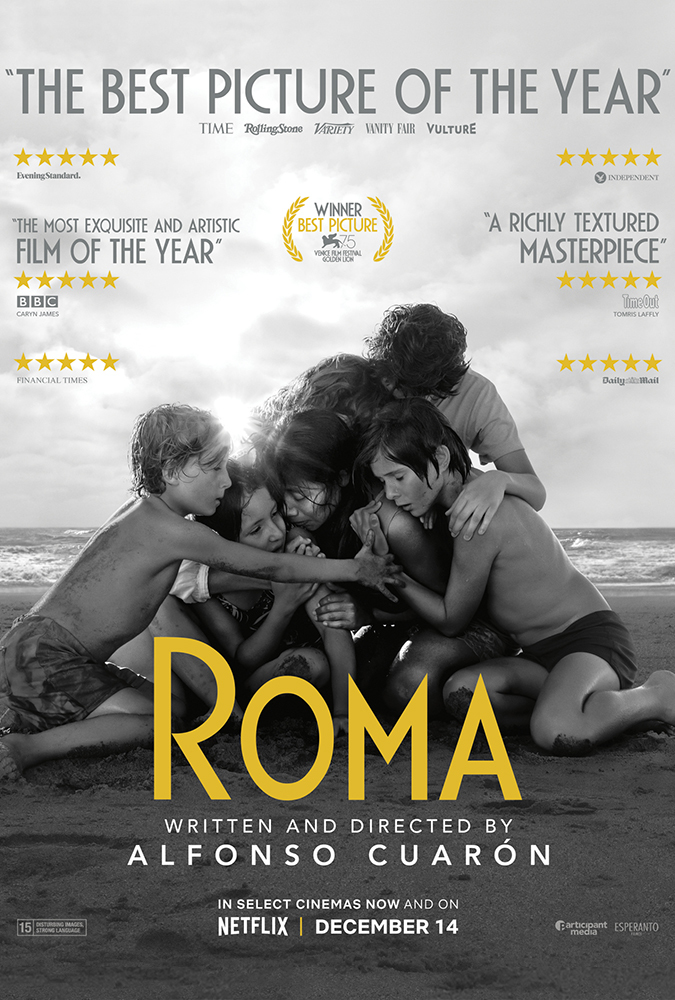“Roma”, 2018
Director: Alfonso Cuarón

Directed by Alfonso Cuarón, this film is a vivid portrayal of domestic strife and social hierarchy amidst political turmoil in 1970s Mexico. Shot in stunning black and white, it centers on the life of a live-in housekeeper of a middle-class family, offering a poignant, intimate perspective on class, family, and personal upheavals.
Starring: Yalitza Aparicio, Marina de Tavira, Diego Cortina Autrey, Carlos Peralta, Marco Graf, Daniela Demesa, Nancy García García, Verónica García, Andy Cortés, Fernando Grediaga;
Production year: 2018;
Genre: drama;
MPAA rating: r;
Duration: 135 min.;
Rating: IMDB: 7,7;
More information about the film “Roma” on the website imdb.com
“Y tu mamá también”, 2001
Director: Alfonso Cuarón

This coming-of-age story directed by Alfonso Cuarón blends humor, eroticism, and social commentary. Following two teenage boys and an attractive older woman on a road trip across Mexico, the film exposes the social and economic disparities of the country while exploring the themes of friendship, sexuality, and love.
Starring: Maribel Verdú, Gael García Bernal, Diego Luna, Diana Bracho, Andrés Almeida, Ana López Mercado, Nathan Grinberg, Verónica Langer, María Aura, Juan Carlos Remolina;
Production year: 2001;
Genre: drama;
MPAA rating: r;
Duration: 106 min.;
Rating: IMDB: 7,7;
More information about the film “Y tu mamá también” on the website imdb.com
“Frida”, 2002
Director: Julie Taymor

This biographical drama portrays the professional and private life of the surrealist Mexican painter Frida Kahlo, played by Salma Hayek. The film explores her artistic genius, her relationship with fellow painter Diego Rivera, and her struggles with her physical condition, set against the backdrop of Mexican culture and politics.
Starring: Salma Hayek, Alfred Molina, Valeria Golino, Ashley Judd, Geoffrey Rush, Edward Norton, Saffron Burrows, Antonio Banderas, Diego Luna, Patricia Reyes Spíndola;
Production year: 2002;
Genre: drama, melodrama, biography;
MPAA rating: r;
Duration: 118 min.;
Rating: IMDB: 7,3;
More information about the film “Frida” on the website imdb.com
“The Three Burials of Melquiades Estrada”, 2005
Director: Tommy Lee Jones

Directed by and starring Tommy Lee Jones, this film tells the story of a ranch hand who commits to fulfilling his promise to his recently deceased Mexican friend to bury him in his hometown. It's a tale of redemption and friendship that highlights the struggles and bonds formed across cultural divides.
Starring: Tommy Lee Jones, Barry Pepper, Julio Cesar Cedillo, Dwight Yoakam, January Jones, Melissa Leo, Levon Helm, Mel Rodriguez, Cecilia Suárez, Ignacio Guadalupe;
Production year: 2005;
Genre: drama, crime, detective, adventure, western;
MPAA rating: r;
Duration: 121 min.;
Rating: IMDB: 7,3;
More information about the film “The Three Burials of Melquiades Estrada” on the website imdb.com
“Nosotros los Nobles”, 2013
Director: Gary Alazraki

This comedy film addresses themes of entitlement, class differences, and the value of hard work through the story of three wealthy siblings who are tricked by their father into believing they are broke, forcing them to do something they have never done before: work.
Starring: Gonzalo Vega, Luis Gerardo Méndez, Karla Souza, Juan Pablo Gil, Ianis Guerrero, Karla Sofía Gascón, Mario Haddad, Mary Paz Mata, Alberto Zeni, Marcela Guirado;
Production year: 2013;
Genre: comedy;
MPAA rating: pg13;
Duration: 108 min.;
Rating: IMDB: 7,3;
More information about the film “Nosotros los Nobles” on the website imdb.com
These films, among others, offer an insightful and entertaining look into Mexican culture, portraying the diversity of Mexican life and the universal themes that resonate with audiences globally.
In summary, films about Mexican culture offer invaluable windows into the rich tapestry of traditions, struggles, and triumphs that shape the Mexican experience. Through a myriad of narratives, ranging from the intimate and personal to the grand and historical, these films provide audiences around the world with the opportunity to engage with complex characters, vibrant landscapes, and enduring themes of family, identity, and resilience. Whether exploring the colorful festivities of “Coco,” the poignant crossings in “Como agua para chocolate,” or the rebellious fervor in “Amores perros,” these cinematic works stand as testaments to the depth and diversity of Mexican culture. They celebrate its beauty, confront its challenges, and ensure that the distinct stories of Mexico continue to resonate on the global stage, captivating the hearts and minds of viewers everywhere.









